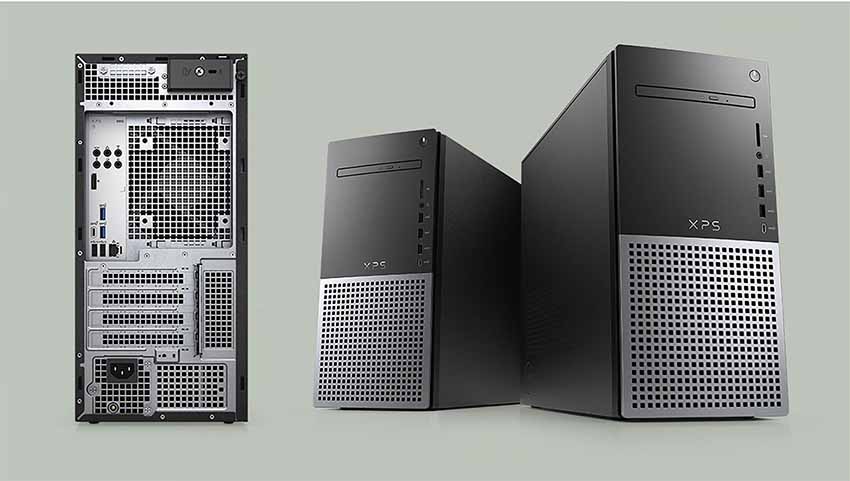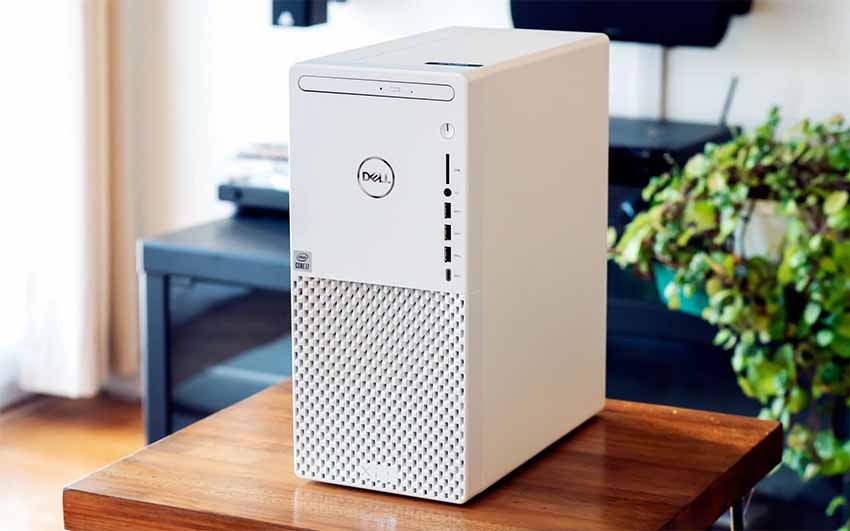Top of our ranking of the best Dell PC for business is the Dell XPS Desktop from the last generation, which has been replaced by the new 8950 model. With the strength of Intel’s 12th-generation Alder Lake CPUs, it is an evolutionary upgrade to one of Digital Trends’ favorite designs.
The best Dell PC for business is an incremental improvement. A more capable processor is possible with optional liquid cooling, and the larger chassis provides superior thermals and airflow. Upgrades are still challenging, but the XPS Desktop strikes a unique combination between sheer power and a tolerable form size. Let’s follow us to find out right now!
Design of Dell XPS Desktop
The designs of the Dell XPS desktops are simple and elegant. The whole line is available in dark grey, while white XPS desktops are also an option (these are special editions and cost a bit extra). A slim DVD/Blu-ray drive may fit in the space provided by the smooth frontage, which also has tastefully positioned ports. The bottom of the device has a grill area to improve ventilation. Even with the most resource-intensive applications running, they have the greatest looks of any PCs you can purchase and operate quietly.

There is a power button on the front, next to the DVD drive (if you want one), along with an SD card slot, three USB-A 3.1 ports, and one USB-C 3.1 port. There are a staggering six more USB ports, an ethernet port, an HDMI 1.4 slot, a DVI port, and a variety of other connections towards the back. If you’re connecting in a device made in the previous five to ten years, it will probably fit in the rear of the Dell XPS. We won’t list them all here. The only thing lacking is compatibility for devices like CFexpress cards and extremely high-speed media, which is a result of the fact that so few PCs now support them.
The XPS computers have the fantastic advantage of allowing you to configure your PC before it is constructed, and everything inside the device is exquisitely crafted. A word of caution: We advise spending the additional $20 to have a WiFi 6 card built-in on less expensive versions rather than the regular type, since you’ll enjoy faster wireless connection speeds and future-proof your device.
Should you choose a built-in DVD or Blu-ray drive? Yes, invest $100 and get the Blu-ray drive if you want to preserve the XPS tower’s understated elegance and you absolutely need to have an optical drive. If not, and you don’t mind having a second device connected through HDMI or USB, you should subsequently purchase an external DVD drive.
Why Dell XPS Desktop is the best Dell PC for business?
Specs and pricing
The XPS Desktop’s customizability is one of its benefits. The base setup for a cheap but capable home office PC is available; alternatively, you may upgrade it with the newest Intel CPUs and Nvidia or AMD graphics cards. Dell provided me a midrange setup with an RTX 3060 Ti and Core i5-12600K.
This specific computer will cost you roughly $1,750 when customized. Due to rising graphics card prices, constructing a comparable workstation on your own would currently cost close to $2,500. And DDR5 is a significant thing. Although DDR5 RAM is currently pricey, Dell included it as standard on the XPS Desktop.
Overclocking is a possibility because my setup included a Z690 motherboard and an unlocked CPU. It’s good to see contrasted to the XPS Desktop 8940 from the previous generation, which occasionally shipped without the Intel chipset necessary to enable an unlocked processor. Although it is technically feasible, overclocking might not be useful. The XPS Desktop is a compact device with little thermal overhead.
The standard version costs $750. It has a Core i5-12400 CPU without a dedicated graphics card, one 8GB stick of RAM, and a 256GB NVMe SSD in addition to these other components.
But what makes the XPS Desktop unique is how you can grow it. A Core i9-12900K, RTX 3080 Ti, 64GB of DDR5 memory, and 4TB of storage evenly distributed between an NVMe SSD and HDD may cost as much as $4,000.
When compared to the hardware within, it is a remarkable amount of bandwidth for a typical desktop PC. Nevertheless, I’m not confident in the power supply’s ability to function in a sophisticated setup. In my Maingear Vybe review, I made the point that 750W is hardly adequate for powerful GPUs. Unfortunately, the XPS Desktop doesn’t provide you the choice to spend more money on a bigger power supply to go with these parts.
Performance
The most recent XPS Desktop showcases Intel’s 12th-generation Alder Lake processors, which are currently the best CPUs available. Even the most costly Intel CPUs from the previous generation cannot compete with the modest Core i5-12600K in my setup.
My Cinebench & Geekbench results show it plainly. All things considered, the Core i5-12600K outperforms the Core i9-10900K, sometimes as much as 47%. Contrast this with the larger Core i7-12700KF found inside the MSI Aegis RS 12, which is able to get a significantly higher score because of its greater core count.

But that’s exactly how my XPS Desktop is set up. The greatest CPU currently on the market, the Core i9-12900K, can be used to make a computer.
Even if you can get by, a midrange setup like this isn’t the greatest for serious video or photo processing. Although the Core i5-12600K is a powerful CPU, the RTX 3060 Ti’s lower performance is insufficient for intensive video editing applications. It can complete the task, but if video and picture editing are important to you, you should invest in a higher-end setup.
Dell XPS desktops User’s reviews
The Dell XPS desktops are difficult to criticize, and the majority of the models have an average rating of 4.3 stars on the Dell website. The speed and efficiency of the XPS computers are often praised by consumers, and practically every review appears to mention how quickly Windows 10 and apps load on them.
Users also like how compact the desktop is, how well-designed it is, and how simple it is to fit underneath or on top of home desks. Many people notice how quiet the XPS series is in comparison to most other computers. Although there are sporadic fan sounds, overall operation is fairly quiet.
Where there have been problems, the majority of customers have been happy with Dell’s customer care, which is renowned for being exceptional. Even while not all problems are properly fixed, the great majority of them are, and consumers appear to be extremely happy with the service.
The more critical reviews tended to highlight particular problems with the software and drivers users were attempting to use on the XPS PCs or features they thought were lacking from the laptops. While some people gripe about the PCs’ performance, few give specific instances of the programs that are making them lag. Even while not everyone will be pleased, it’s encouraging to see Dell respond so positively to almost every unfavorable comment.
Conclusion
The favorite designs are improved in the Dell XPS PC – the best Dell PC for business. Even if they aren’t ideal, the bigger enclosure reduces noise and thermals, and the configuration choices are unparalleled, especially for the cost.
The XPS Desktop delivers a lot of power for a lot less than what complete gaming or workstation PCs cost, even while it isn’t a foundation for building your own PC. However, if you have more money to invest, you may get a fancier system that is more geared toward work or gaming.